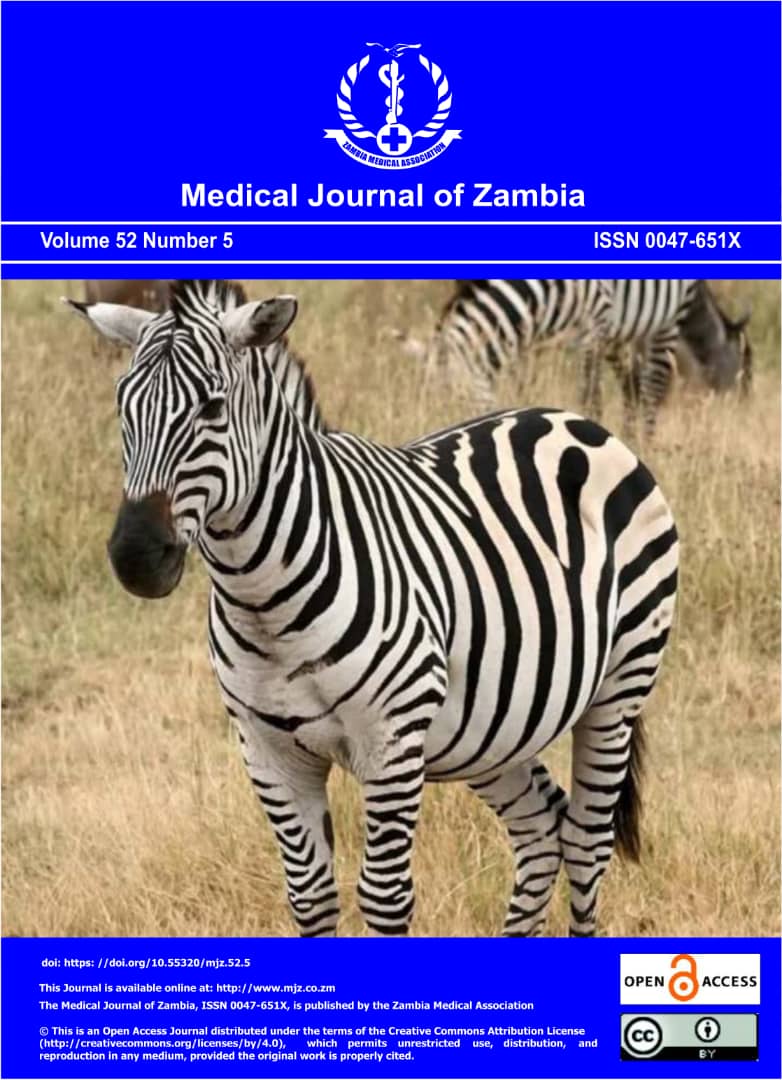Experiences of emergency medical services staff on delivery of emergency medical services in Chobe district, Botswana
DOI:
https://doi.org/10.55320/mjz.52.5.800Abstract
Background: Emergency Medical Services (EMS) personnel in Chobe, Botswana, operate in a remote region with limited infrastructure. They face challenges such as geographical isolation, wildlife risks, like encounters with elephants or lions during emergency calls and shortages of equipment and staff. These stressors can impact the effectiveness of emergency care provision and the well-being of EMS staff.
Objectives: To explore lived experiences of EMS staff in Chobe, on the delivery of emergency medical services in Chobe District of Botswana.
Methods: A qualitative case study design was employed to explore the lived experiences of EMS staff. This design enabled an in-depth understanding of participants' perspectives within their real-life context. Data were collected through in-depth, semi-structured interviews with eight EMS staff members selected using purposive sampling, ensuring the inclusion of participants with relevant knowledge and experience. Thematic analysis was used to analyze the data, following Braun and Clarke’s updated reflexive approach [1]. This involved six iterative steps: familiarization with the data, generating initial codes, searching for themes, reviewing themes, defining and naming themes, and producing the final report. This method allowed for the systematic identification and interpretation of key themes that emerged from the data.
Results: Four key themes emerged from the data, reflecting the lived experiences of Emergency Medical Services (EMS) staff in the Chobe region: (1) operational challenges, (2) Psychosocial stain and coping, (3) professional identity and team dynamics , and (4) environmental and safety risks. 1. Operational Challenges: Participants reported persistent shortages of essential resources, including ambulances, medical equipment, and staff. These constraints often resulted in delayed response times and hindered the delivery of effective emergency care.
2. Psychosocial strain and Coping: EMS personnel described experiencing significant physical exhaustion and emotional strain. Exposure to traumatic scenes, extended shifts, and lack of psychosocial support contributed to burnout. Coping strategies were mainly informal—such as peer debriefing and emotional withdrawal— and were perceived as inadequate.
3. Professional Identity and team dynamics: Respondents expressed frustration over limited training opportunities, unclear career progression, and a perceived lack of appreciation for their work. These factors negatively impacted morale and professional development.
4. Environmental and Safety Risks: The Chobe environment presented unique hazards, including encounters with wild animals, poor road infrastructure, and vast distances between emergency sites and healthcare facilities. These risks compromised both the safety of EMS staff and the quality of emergency response.
Discussion: This study highlights that the delivery of Emergency Medical Services (EMS) in the Chobe region is significantly affected by a combination of operational limitations, professional challenges, staff well-being concerns, and environmental risks. These interconnected issues compromise the effectiveness and safety of EMS delivery. To address these challenges, it is essential to implement clear policies, allocate adequate resources, provide structured mental health support, and offer ongoing professional training. Such measures would improve both service delivery and the overall well-being of EMS personnel in remote and high-risk settings like Chobe. Keywords: Emergency Medical Services, pre-hospital care, psychological distress, staffing shortages, qualitative research.
Downloads
References
Downloads
Published
Issue
Section
License
Copyright (c) 2025 Medical Journal of Zambia

This work is licensed under a Creative Commons Attribution-NonCommercial 4.0 International License.









